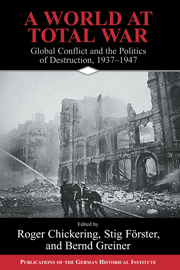Book contents
- Frontmatter
- Are We There Yet? World War II and the Theory of Total War
- Part A The Dimensions of War
- 1 Total War: The Global Dimensions of Conflict
- 2 Total War: The Conduct of War, 1939-1945
- 3 The Ultimate Horror: Reflections on Total War and Genocide
- Part B Combat
- Part C Mobilizing Economies
- Part D Mobilizing Societies
- Part E The War against Noncombatants
- Part F Criminal war
- Index
3 - The Ultimate Horror: Reflections on Total War and Genocide
Published online by Cambridge University Press: 05 January 2013
- Frontmatter
- Are We There Yet? World War II and the Theory of Total War
- Part A The Dimensions of War
- 1 Total War: The Global Dimensions of Conflict
- 2 Total War: The Conduct of War, 1939-1945
- 3 The Ultimate Horror: Reflections on Total War and Genocide
- Part B Combat
- Part C Mobilizing Economies
- Part D Mobilizing Societies
- Part E The War against Noncombatants
- Part F Criminal war
- Index
Summary
The radicalization of warfare appears to have reached a climax during the Second World War. Not only did the belligerent powers come closer than ever before to putting total war into practice, but this war also witnessed the most shocking genocide in history. The Second World War is thus rightly regarded as the ultimate horror of the modern age. It resulted in the deaths of some 60 million people worldwide, at least 10 percent of whom fell victim to some form of genocidal action.
The moral dimensions of this catastrophe were enormous, but they must not obscure the effort to explain. This essay accordingly examines analytically the relationship between total war and genocide in the Second World War. It also offers some general reflections on the relationship between the two phenomena, particularly about the extent to which genocide represents a constituent element of total war.
Total war and genocide share the characteristic of being difficult to define. While several attempts have been made to study genocide comparatively, a model has only recently been proposed to overcome the many theoretical difficulties. In the first part of this essay, we shall therefore offer a theoretical model that is intended to address both genocide and total war.
- Type
- Chapter
- Information
- A World at Total WarGlobal Conflict and the Politics of Destruction, 1937–1945, pp. 53 - 68Publisher: Cambridge University PressPrint publication year: 2004
- 2
- Cited by



